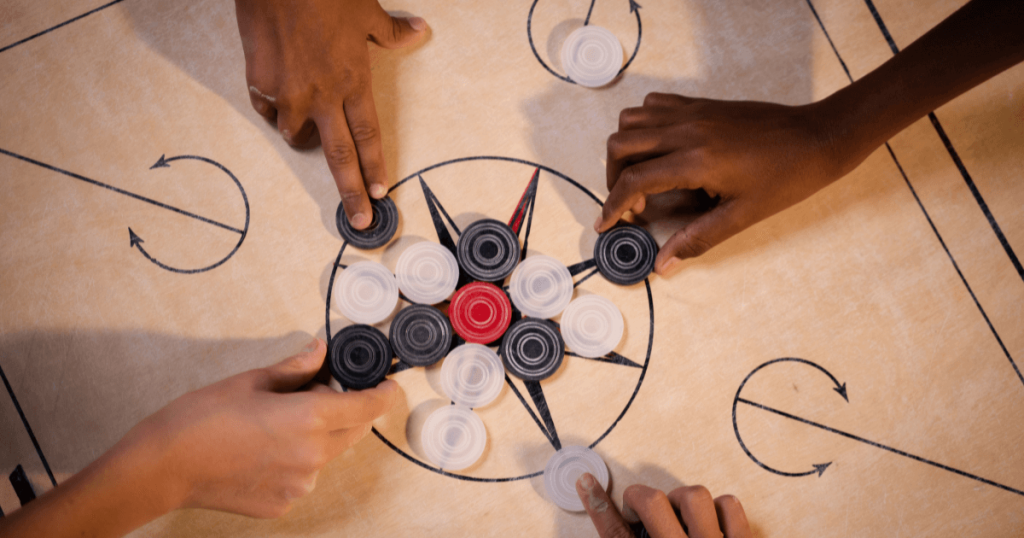When we think about games, we often imagine entertainment, fun, and competition, but games go beyond just these surface elements. Games have an uncanny ability to bring people together, sparking laughter, connection, and a sense of belonging. The psychology of play is fascinating because it taps into our social needs, emotions, and desires to bond with others. Whether it’s a board game around the dinner table or a multiplayer video game online, games serve as a powerful tool for strengthening relationships and building communities.
In this article, we’ll delve into why games are so effective in fostering connections and the deep psychological aspects that make them so engaging. By exploring the different ways games create lasting bonds, you’ll understand why games aren’t just a pastime – they are a social glue that unites us all.
Psychology of Play and Human Connection: How Games Help Us Bond
Games do more than entertain – they create shared experiences that foster connections between people. From childhood to adulthood, play is ingrained in human nature, and the psychological benefits of playing together are vast. When we engage in games, we enter a unique social space where cooperation, teamwork, and competition blend together.
The psychology behind this is rooted in human behavior. Games stimulate our brains in a way that fosters bonding, releases stress, and strengthens our sense of empathy. These interactions create a sense of community, making us feel connected and supported. Whether it’s through shared victories or playful banter, games allow us to express ourselves in ways that build trust and mutual understanding.

Social Benefits of Playing Games With Others
Playing games with others has long been recognized for its social benefits. From improving communication skills to enhancing group dynamics, games provide a fun and effective way to interact and connect. The shared activity fosters cooperation, helping individuals work together towards a common goal.
Games also encourage inclusivity, breaking down barriers and offering opportunities for diverse groups to unite over a shared purpose. Whether it’s a family game night or a corporate team-building exercise, playing together allows individuals to share moments of joy, challenge, and teamwork, which contribute to stronger relationships.

Types of Games That Build Stronger Relationships
When it comes to strengthening bonds, not all games are created equal. Certain types of games foster connections in different ways, offering unique benefits based on how they engage participants. These games range from strategic to casual, and their ability to unite people is unmatched.
- Cooperative games (e.g., Pandemic, Forbidden Island) encourage players to work together rather than against each other.
- Team-based games (e.g., Charades, Pictionary) enhance communication and trust between participants.
- Card games (e.g., Cards Against Humanity, UNO) create opportunities for laughter and lighthearted competition.
- Role-playing games (e.g., Dungeons & Dragons) allow for deep storytelling and connection through shared imagination.
- Trivia games (e.g., Jeopardy!, Trivial Pursuit) spark fun competition while providing a chance to learn and bond.
By understanding the different types of games that promote unity, you can select the best ones for your next social gathering.

Group Games That Encourage Teamwork and Trust
Group games are an excellent way to encourage teamwork and build trust. When individuals come together to achieve a common goal, the need for cooperation, communication, and compromise becomes paramount. This builds trust and strengthens relationships, whether it’s a corporate team-building retreat or a fun family get-together.
Here are some popular group games that encourage teamwork:
- Escape Room Challenges: Teams must work together to solve puzzles and escape within a time limit.
- Capture the Flag: A physical, competitive game where teams collaborate to capture the opposing team’s flag.
- Human Knot: A trust-building exercise where participants must untangle themselves without letting go of each other’s hands.
- Scavenger Hunts: A fun way to collaborate and bond as teams race to complete challenges.
By engaging in these games, you’ll not only have fun but also improve your ability to work with others, building lasting trust and camaraderie.

Board Games That Bring Families Closer
Board games have been a staple of family gatherings for generations, and for good reason. They offer a structured, yet entertaining way to engage with one another, providing opportunities for laughter, teamwork, and healthy competition.
Some of the best family board games include:
- Monopoly: A classic game that encourages strategic thinking while also allowing for friendly rivalry.
- The Game of Life: A fun and educational game that simulates real-life scenarios and promotes family discussions.
- Scrabble: A word game that encourages language skills and can spark family debates over the best words.
- Clue: A mystery game that requires deduction and can be enjoyed by players of all ages.
These games promote interaction, laughter, and learning, creating memories that bring families closer together.

Online Multiplayer Games That Create Real Friendships
In the digital age, online multiplayer games have become a popular way for people to connect across distances. These games offer unique opportunities to form friendships, build teams, and create communities. The bonds formed in online gaming can be just as strong as those made in person, with players sharing experiences, strategies, and victories together.
Popular online games that promote friendships include:
- Fortnite: A battle royale game that has built a massive online community.
- Minecraft: A sandbox game that encourages creativity and collaboration between players.
- World of Warcraft: A massively multiplayer online game (MMO) where players work together in a fantasy world.
- League of Legends: A team-based competitive game that has created a global community of players.
These games offer not just entertainment, but also opportunities to connect with like-minded individuals and build lasting friendships.

Card Games for Social Gatherings and Family Fun
Card games are a timeless choice for social gatherings, whether it’s a casual get-together or a formal family event. These games are easy to learn, versatile, and can be enjoyed by players of all ages. From classic card games to modern variations, these games offer a fun way to bond over friendly competition.
Some favorite card games include:
- UNO: A fast-paced game that’s easy to learn and fun for all ages.
- Poker: A classic game that combines skill and strategy, perfect for a night of friendly competition.
- Go Fish: A simple card game that’s ideal for children and family play.
- Cards Against Humanity: A more adult-oriented game that encourages humor and conversation.
Card games provide a perfect blend of casual fun and social interaction, making them a go-to choice for many social events.

Icebreaker Games for New Friendships and Team Building
Icebreaker games are the perfect way to warm up a group and foster connections, especially in new or unfamiliar settings. Whether you’re at a conference, a team-building retreat, or a party, icebreakers help participants relax, get to know each other, and form connections.
Here are some fun icebreaker games to consider:
- Two Truths and a Lie: Participants share two truths and one lie, and others have to guess which is the lie.
- Human Bingo: Create bingo cards with traits or facts that participants can check off by finding others who match.
- Speed Networking: Quick, timed interactions where participants move around the room and meet as many people as possible.
- The Name Game: Participants introduce themselves with an adjective that starts with the same letter as their name.
These games help participants feel more comfortable with each other and lay the foundation for lasting relationships.

Party Games That Make Everyone Feel Included
Party games are the heart of many social gatherings, offering fun and laughter while ensuring everyone feels involved. Whether you’re hosting a large celebration or a small intimate gathering, the right games can create an inclusive atmosphere where every guest can participate, no matter their age or background. These games are designed to break the ice, foster connection, and make everyone feel like they belong.
Here are ten party games that bring out the best in everyone:
- Charades: A classic game that requires no special equipment, just a group of willing participants. It’s perfect for all ages, and the laughter is contagious.
- Pictionary: Grab a whiteboard and markers and get creative as teams guess each other’s drawings. It’s always full of surprises.
- Werewolf/Mafia: A social deduction game where players must figure out who the “bad guys” are. It encourages communication and teamwork.
- Musical Chairs: A simple game that gets everyone moving, bringing energy and fun to the party.
- Heads Up!: A guessing game app that’s perfect for all ages and keeps everyone laughing.
- Pass the Parcel: A great game for kids and adults, where participants pass a gift around while music plays, and whoever holds it when the music stops wins.
- Minute to Win It: A series of quick, fun challenges that everyone can join in on, with just a minute to complete them.
- Truth or Dare: A simple game of dares and truths that breaks the ice and encourages fun, silly moments.
- Karaoke: Perfect for a party, karaoke gets everyone involved, whether they’re singing or cheering on others.
- Twister: A physical game that gets people interacting and laughing while testing their flexibility and coordination.
These games are simple but effective ways to ensure no one feels left out, fostering a light-hearted atmosphere where everyone has a chance to be involved.

Why Cooperative Games Are Good for Group Psychology
Cooperative games, where players work together to achieve a common goal, have a unique psychological effect on groups. These games encourage collaboration, enhance problem-solving skills, and promote a sense of unity. By focusing on shared success, players bond over the experience, often developing stronger relationships in the process.
Some great cooperative games include:
- Forbidden Island: A game where players must work together to collect treasures and escape before the island sinks.
- Hanabi: A cooperative card game where players must communicate and deduce the correct cards to play.
- Pandemic: A strategy game where players work together to stop the spread of diseases around the world.
These games provide opportunities for teamwork, stress relief, and social bonding.

Game Night Traditions: Strengthening Bonds Over Time
Game night traditions have long been a staple of family gatherings and social events, offering a chance to connect and create lasting memories. These traditions bring people together, fostering a sense of routine and continuity. Over time, the shared experiences of playing games become a cherished part of family or friendship bonds, creating an emotional connection that can be passed down through generations.
Many families or groups have their own unique game night rituals, whether it’s the snacks they prepare, the specific games they always play, or the way they organize the evening. These traditions provide a sense of security and familiarity, making game night something to look forward to each week or month.
Games like Scrabble, Monopoly, or even Charades are often passed down from one generation to the next, becoming a part of family history. These simple moments of togetherness become treasured memories, strengthening relationships and reinforcing the idea that spending time together is important.

How Childhood Games Shape Social Development
Childhood games are not just fun—they play a significant role in shaping social development. Through play, children learn essential social skills such as communication, empathy, cooperation, and problem-solving. These early experiences with games help children understand the importance of rules, teamwork, and how to interact with others in a variety of settings.
From games like hide-and-seek to more structured games like tag or Simon says, children learn how to cooperate, take turns, and share space with others. These early lessons in social interaction are crucial in shaping a child’s ability to navigate the world around them.
Additionally, competitive games like chess or board games help children learn about strategy, patience, and how to cope with winning and losing, fostering resilience. As they grow older, these foundational skills play an important role in how they engage in more complex social dynamics.

Laughter, Competition, and Belonging: A Personal Take on Playing Together
To me, the beauty of playing games lies in their ability to bring people together in the most unexpected ways. Whether it’s the laughter shared over a silly game of Pictionary or the excitement of competing in a friendly round of Monopoly, games create a space for people to connect. There’s something deeply human about the competition, the humor, and the bonds formed through play.
Games offer an escape from daily stresses, allowing people to step into a world where the rules are simple, and the stakes are low. They remind us that fun is important, and that sometimes, it’s the simplest activities that leave the most lasting impressions. In my experience, playing together—whether with family, friends, or even strangers—has always led to a deeper sense of belonging. The shared moments of joy and the friendly rivalry strengthen our connections, leaving us with not just a fun experience, but one that reinforces our ties to each other.

Why We Keep Coming Back to Games to Feel Connected
Games are more than just an escape – they serve as a key component of human connection. Whether it’s through teamwork, competition, or just having fun, games provide an outlet for emotional expression and social interaction. They allow us to experience joy, challenge, and collaboration in a way that strengthens our relationships.
As we continue to engage with games in various forms, we realize that their power to bring people together goes far beyond just fun. Games offer a shared experience, a space where we can connect, laugh, and create lasting memories with those around us.










Leave a Reply